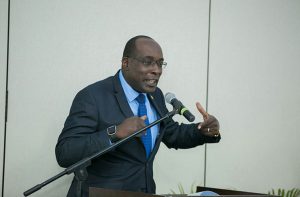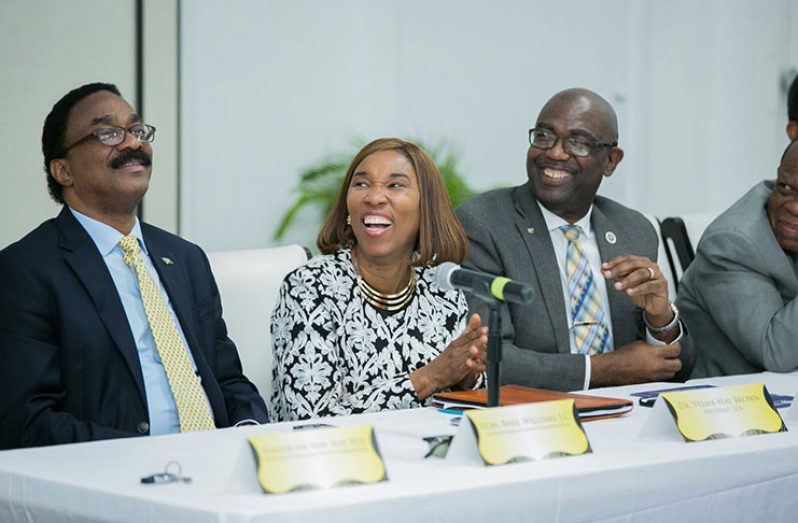The Government of Guyana is moving ahead with plan to establish a Law School here to meet the needs of local and international law students. After nearly two decades of discussions and lobbying for an alternative law school to the Norman Manley Law School at the University of the West Indies, the JOF Haynes Law School of the Americas (JHLSA), will come to pass through a private-public partnership between the Government of Guyana, Law School of the Americas (LCA) and the University College of the Caribbean (UCC).
The collaborative project was officially launched last Thursday at the Spanish Court Hotel in Jamaica.
JHLSA will be added to the options available to students who hold a Bachelor of Laws and have intentions to pursue their Legal Education Certificate, qualifying them to practise law throughout Commonwealth Caribbean territories.
The JOF Haynes Law School of the Americas, named after prominent Guyanese jurist, Joseph Oscar Fitzclarence Haynes, is expected to build on the legacy of the Norman Manley Law School and its counterparts – The Hugh Wooding Law School in Trinidad and Tobago and the Eugene Dupuch Law School in the Bahamas.
Jamaica’s Minister of Education, Youth and Information, Ruel Reid, in his role as keynote speaker, endorsed this Memorandum of Understanding (MoU).

“I know the frustration that many qualified Jamaican, and indeed Caribbean nationals face with trying to get a toe through the entrance to the Norman Manley Law School at the Mona Campus of the University of the West Indies … Let’s not be afraid of competition but rather establish and maintain our institutions at such high standards offering quality education and training that they will attract the best of the best locally and internationally as students and faculty,” Minister Reid said.
President of the Law School of the Americas, Dr. Velma Brown-Hamilton, who is a driving force behind the partnership, said JHLSA will complement the Legal Education Certificate programme at the Norman Manley Law School, which has not been able to meet the demand for lawyers.
POSITIVE DEVELOPMENT
In alluding to the low entrance rate of graduates from his institution to the Norman Manley Law School, President and Executive Chairman of UCC Winston Adams said he welcomes the development.
According to him, a public-private partnership of this kind sends very positive signals to the citizens of Jamaica, Guyana and the wider region.
In support, Jamaica Attorney General, Marlene Malahoo-Forte, stated that this establishment will significantly improve access to legal education in the Caribbean and, in turn, contribute to growth and development in the region.
Malahoo-Forte further noted that she was confident the law school “will strengthen capacity in the region to deal with areas of law that are becoming increasingly important to the region”, highlighting the need for lawyers trained in legal and regulatory issues related to the oil and energy sectors after the recent discovery of commercial quantities of oil off the coast of Guyana.
She also pointed out a similar demand for lawyers who are trained to meet demands that will emerge as Jamaica positions itself to become the logistics centre of the Caribbean.
“The courses offered will be innovative, practical and driven toward entrepreneurship as well as the needs of the respective territories. The JOF Haynes Law School will be a catalyst for the new economy for the region and developing countries. Importantly, it solidifies our vision to give access to legal education to a wider cross-section of people who are duly qualified,” Brown-Hamilton explained.
Cybercrime and money laundering are two key nontraditional areas of specialisation being explored.
Guyana’s Attorney General and Legal Affairs Minister Basil Williams, in delivering remarks, disclosed that the Government of Guyana has allocated funding so far for the first two years. Graduates of the LLB programmes offered by the LCA and UCC law faculties, as well as those from other law faculties across the Caribbean, will benefit from priority admission to the planned two-year programme at JHLSA, starting September 2017/January 2018.
Additional development in legal education is expected to foster greater understanding and awareness of legal rights, including constitutional rights, which may further translate into peaceful and productive societies.











